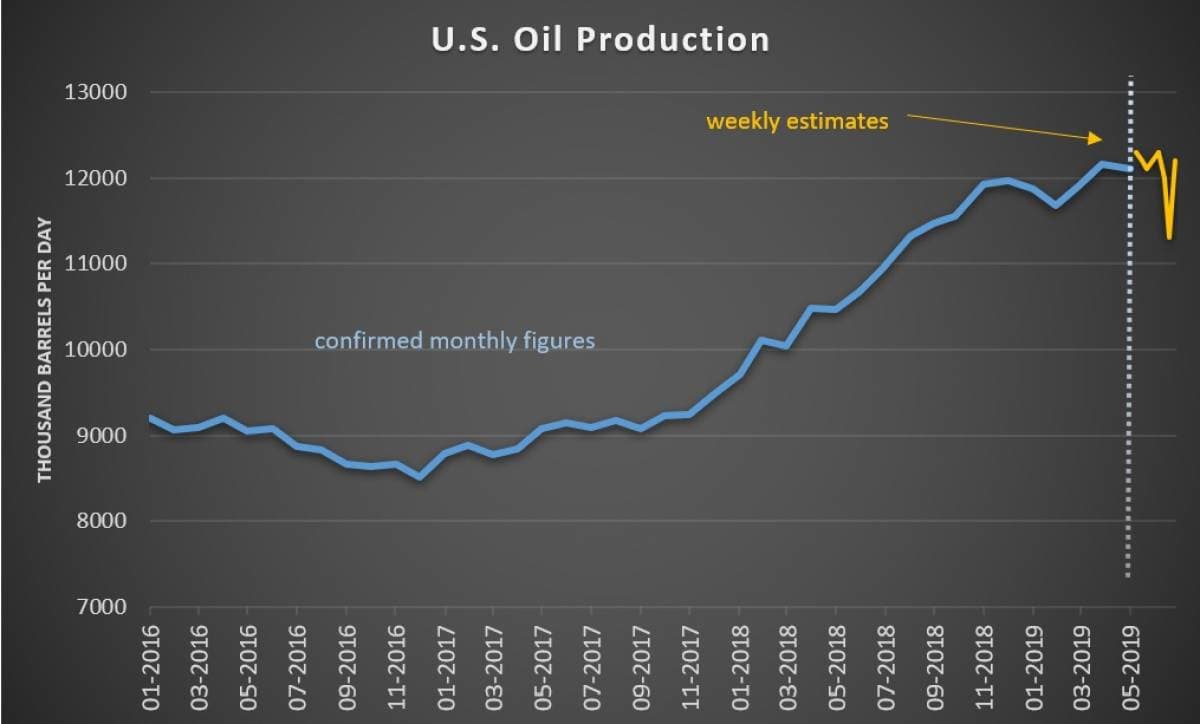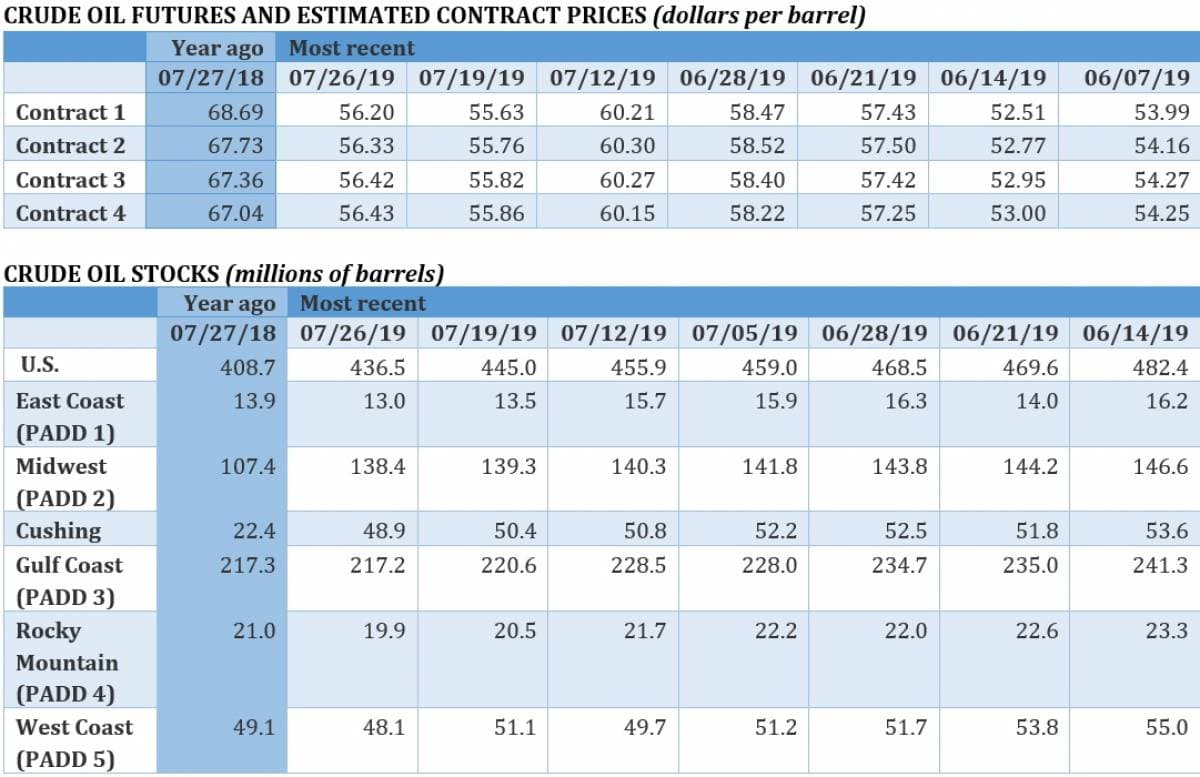An escalation of the trade war sent oil prices plunging on Thursday, and China is threatening to retaliate if the new tariffs come into play







Oil prices fell by 7 percent on Thursday, the worst single-day performance in over four years. President Trump’s surprise announcement that he would put a 10 percent tariff on $300 billion worth of Chinese imports caused a widespread selloff in equities and oil prices. China said that it would retaliate if the tariffs go into effect. Trump left open the possibility that the U.S. could hold off, but only if China offered concessions.
Oil rebounds. With a selloff as steep as the one seen on Thursday, it was unsurprising that traders bought on the dip. Oil was up 3 percent in early trading on Friday.
Natural gas down. While oil received all of the attention, natural gas has also fallen sharply. Nymex prices for September delivery fell to $2.10/MMBtu on Friday, another multi-year low. Meanwhile, in Europe, natural gas and LNG hit 10-year lows in June and while they rose on Thursday, the outlook is bearish. There is some concern that storage could fill up by the end of summer in parts of Europe. “I think it will be a rough August in general,” a gas trader told Reuters.
Energy stocks meltdown. With oil down 7 percent, nobody in the energy sector was spared. Many companies saw their share prices fall 7 or 8 percent, some fared better but others posted even deeper loses. Energy Select Sector SPDR Fund (or XLE) fell more than 2 percent.
Concho misses earnings. Concho Resources (NYSE: CXO) reported a surprise 25 percent decline in quarterly profit on Wednesday, mostly due to lower oil and gas prices. Concho said its Permian wells were spaced too close together, and the company said it would slow the pace of development. Concho’s share price fell by 22 percent on Thursday.
Iran exports plunge, perhaps down to 100,000 bpd. Iran’s oil exports plunged to just 100,000 bpd in July, although there is a dispute over the accuracy of that data. If true, volumes are down sharply from the 400,000 bpd in June. Meanwhile, the Iranian government approved a plan to lop off a few zeros from its currency and rename it amid bad inflation.
Libyan production falls below 1 mb/d. Libya’s oil production fell to just 950,000 bpd after the Sharara field went offline for the second time in as many weeks. The outage is a sign of deteriorating security as the 4-month civil war drags on.
OPEC production falls to 8-year low. OPEC production fell to just 29.42 mb/d in July, down 280,000 bpd from June. Voluntary cuts from Saudi Arabia and steep losses from Iran contributed to the lower figure.
Trump considers quarantine of Venezuela. When asked if he was considering a blockade or quarantine of some kind of Venezuela, President Trump said: “Yes, I am.” He did not offer any further details.
Enbridge pipeline explodes. Enbridge (NYSE: ENB) had one of its natural gas pipelines explode in Kentucky, which killed 1 and injured six others. The incident puts a spotlight on Enbridge’s safety record as it seeks to build controversial replacement pipelines for Line 3 and Line 5.
ExxonMobil Baytown fire injures 37. An explosion and fire at ExxonMobil’s (NYSE: XOM) Baytown petrochemical complex injured 37 people and sent a plume of black smoke over the Houston area. The fire hit Exxon’s olefins plant. Harris County filed a lawsuit against Exxon over the pollution from the fire. Related: The Bakken Oil Boom Is Facing A New Bottleneck
Exxon reports $3.1 billion in quarterly profit. ExxonMobil (NYSE: XOM) reported a $3.1 billion profit for the second quarter, down 21 percent from a year earlier. Upstream liquids production up 8 percent. Permian production was up 90 percent from the same period last year. Capex was also up to $8 billion, a 22 percent increase from a year earlier.
Chevron earnings up 27 percent. Chevron (NYSE: CVX) reported stronger-than-expected earnings on Friday, pushed higher by production increases. Chevron’s profit jumped by 27 percent, although that was magnified by a one-off $740 million termination fee from Occidental Petroleum (NYSE: OXY) after the Anadarko takeover.
ADVERTISEMENT
Occidental earnings off 25 percent. Occidental Petroleum (NYSE: OXY) reported a $635 million profit in the second quarter, which was down 25 percent from a year earlier. However, investors are more focused on the $38 billion acquisition of Anadarko Petroleum, which should close this month. Meanwhile, Oxy announced a joint venture with Colombia’s Ecopetrol to develop 100,000 net acres in the Permian. Ecopetrol will pay $750 million up front and will carry another $750 million in capital. Oxy will maintain a 51 percent stake in the joint venture.
Shell disappoints on earnings, cites low LNG and natural gas prices. Royal Dutch Shell (NYSE: RDS.A) reported disappointing earnings for the second quarter on Thursday, with earnings down 26 percent. Shell was hit on all fronts, and sounded downbeat about the trajectory of the economy. “We’ve seen some very severe macroeconomic headwinds -- probably most pronounced in our downstream business where we saw some weaker refining margins -- but especially a much weaker trading environment for petrochemicals,” Chief Executive Officer Ben Van Beurden said in a Bloomberg TV interview on Thursday. “In our upstream, we’ve seen headwinds particularly in North American gas.” With Shell more heavily invested in gas and LNG than its fellow oil majors, the downturn in global gas markets hit hard. Related: A Surprising Innovation In Energy’s Hottest Market
BlackRock lost $90 billion in fossil fuel investments. A new report found that BlackRock (NYSE: BLK), the world’s largest investor, lost around $90 billion over the past decade through investments in fossil fuel companies.
North Dakota challenges Washington rail law. Washington State has a law set to take effect in January 2020 that would prevent refineries from unloading oil from trains with a psi above 9, which could exclude oil from the Bakken. The law is intended to reduce the risk of oil-by-rail accidents that result in explosions. North Dakota fears the law could impact as much as 200,000 bpd of production, and the state is seeking help from the Trump administration, asking regulators to overrule Washington’s law.
LNG prices hit 3-year low. Asian spot prices for LNG fell to a 3-year low this week, with spot prices for September delivery down to just $4.10/MMBtu.
By Tom Kool of Oilprice.com
More Top Reads From Oilprice.com:



















President Trump started a trade war against China, lost it and now he doesn’t know how to end it without losing face. And losing face he will because he has no alternative but to end it on China’s terms otherwise it could affect his chances in the next presidential elections in 2020.
It is possible that President Trump was prevailed upon by hawks in his administration particularly the likes of John Bolton to wage a trade war on China believing that China will kowtow with the first set of tariffs imposed on it. Little he and his advisers knew that China will not only retaliate blow by blow against every set of tariffs imposed on it but it will win the war.
Neither President Trump nor his advisers realized what a heavy weight they are dealing with. Nobody could rise to become the president of the world’s largest economy based on purchasing power parity (PPP) with authorities unmatched in any of the world democracies if one doesn’t have nerves of steel and the intellect to match. President Xi Jingping has emerged from all his meetings with President Trump with the upper hand. The latest meeting in Osaka during the G-20 summit was no exception. In that Meeting President Trump announced that he will reduce restrictions on trade with the Chinese Telecom giant, Huawei, so as to get the trade talks with China going having been declaring all along that Huawei is a national security risk.
President Trump is well advised to cut his losses and end the trade war because it is hurting US economy far more than China’s as his former chief financial adviser admitted three days ago.
Still, a deal will be reached a short while before the presidential elections so that President Trump could ensure getting another term in the White House.
Meanwhile, the global economy continues to pay the price for President Trump’s egoism and limited intellect which makes him vulnerable to manipulation by the hawks in his administration.
Western media particularly Reuters quoting unidentified sources are competing in inundating the global oil markets with misinformation about Iran’s crude oil exports. The latest unsubstantiated claim is that Iranian crude oil exports plunged in July to 100,000 barrels a day (b/d).
According to the authoritative 2019 OPEC Annual Statistical Bulletin, Iran exported on average 1.85 million barrels a day (mbd) in 2018 despite US sanctions when western media was talking about a reduction of 500,000 b/d to 1 mbd as a result of the sanctions.
Moreover, the Bulk of Iranian crude is being exported to countries which have never accepted US sanctions and have continued to buy Iranian crude, namely China, India, Turkey and even Russia (food-for goods). Furthermore, Iran is managing to sell more of its crude in spot markets as well as to countries which don’t want to be identified for fear of US reprisals. There you have it.
What is causing this outpouring of misinformation is the frustration and anger that US sanctions against Iran have so far failed miserably. Not only foreign buyers of Iranian crude oil are receiving price discounts and other benefits from Iran but they are also getting great satisfaction in helping frustrate US sanctions and in defying the United States with impunity.
Dr Mamdouh G Salameh
International Oil Economist
Visiting Professor of Energy Economics at ESCP Europe Business School, London
Investors are fickle. I am of the belief that the investor class would invest in genocide if it paid a profit.
I will continue to read, but with a wary and skeptical eye.